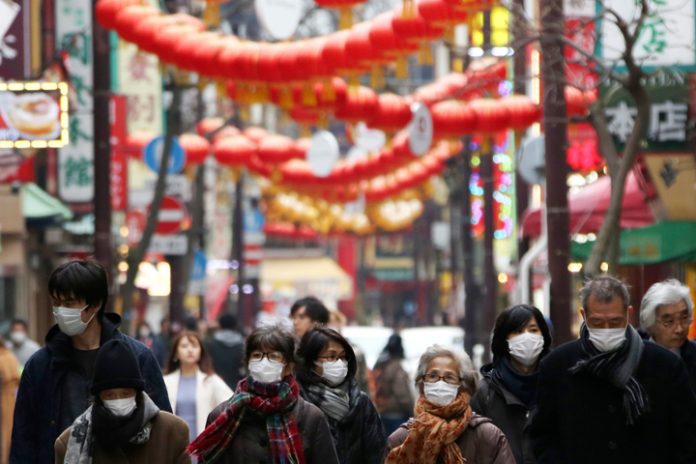
According to information provided by the Japanese Embassy in Moscow, as of 30 March, the number of people infected with the novel coronavirus in Japan was 1866 people. 10 thousand people have 0,15 ill.
By the end of last week in Japan was recorded 56 deaths due Covid-19. The above data do not include the 712 cases and 10 deaths on a cruise ship Diamond Princess, docked in February off the coast of Yokohama.
at the end of February, held under the auspices of the government of Japan expert meeting voiced a forecast that the next weeks are a critical moment “which will show if the virus dramatically spread or stop the spread”. Although in the beginning of March, the experts were inclined to believe that the rapid spread of infection in the country is not observed and the spread of infection to some extent rests on a stable level, it was said that for some period of time, the number of cases will continue to grow, while there will be temporary fluctuations in the direction of growth or reduction.
overall Japanese strategy for fighting it is based on three pillars: 1) early detection and prompt action in respect of clusters (groups), 2) early diagnosis of patients and expansion of intensive care and provision of health services for the seriously ill, and 3) change behavior of citizens.
the Fact that in Japan there is no growth in the number of deaths, suggests that even in conditions of limited medical resources, Japanese physicians are able to identify most patients with the possibility of severe symptoms and offer them appropriate treatment. Which in turn indicates a high level they provide medical care.
in terms of changing the behaviour of citizens, in General, the Japanese are sensitive to the new realities – that there are examples that are confirmed by the sociologists. Tokyo Governor Yuriko Koike notlong urged residents to avoid going outside unless absolutely necessary. Her calls seem to have triggered a response across the country – and the number of those who remained at home nearly doubled from 43% in February. According to a weekend poll the Nikkei / TV Tokyo, 83% of respondents said they spend at home more time than usual.
according to The Washington Post, in East Asia, the pandemic coronavirus is competing ways: the mass testing (South Korea) and target testing (Japan).
South Korea has achieved praise for the quick widespread availability of tests for coronavirus, and there are already inspected approximately 400 thousand people – at the same time discovered more than 9.5 thousand people infected. Japan, whose population is more than two times higher than in South Korea, has spent more than 48 000 tests for approximately 28 thousand people and found about 1,800 cases of infection. This led to a debate in Japanese society: is the country less infections than in South Korea, simply because in Japan tested less people? In accordance with government recommendations in Japan, the patients who are not elderly, it is recommended not even to visit a doctor, if they have no fever for four days, and they are unable to be tested without the advice of a doctor.
Supporters of adopted in Japan, the methodology of counting cases that it has enabled the Japanese health care system to focus limited resources on the truly sick patients and keep the number of casualties relatively low.
Also in Japan, saying that inaccurate tests could do more harm than good. Last week, Spain ceased to use the test kits imported from China, finding that their accuracy is only 30 percent.
says Professor of Virology at Tohoku University and member of the government Advisory group Hitoshi Oshitani, it is impossible to identify all carriers of the virus, as they sayvacations people often have no symptoms. So the idea was to focus on the people caught in the most difficult conditions, and to encourage people with mild symptoms to stay home.
In light of the recent jump in the number of infected without new restrictive measures, is clearly not enough – despite the fact that have had to sacrifice the Tokyo 2024 Olympics. Japan will intensify efforts to arrest the spread of the coronavirus. Japan, according to information from government sources, close the entrance of foreigners coming from the United States, China, South Korea and most of Europe. According to the newspaper Asahi, the people who are not Japanese citizens who visited any of these regions in the last two weeks will not be allowed to come to Japan. Tokyo can also spread the ban on travel to certain countries of South-East Asia and Africa (and also on arrival there).
To date restrictions were not as strict: Japan prohibits the entry of citizens from certain areas of South Korea, China and from many European countries. Persons entering from the United States, China and South Korea, asked to stay on a two-week quarantine.
Japanese nationals under the upcoming restrictions on entry to their homeland will not be affected. However, many have concerns that Prime Minister Shinzo Abe may move to declare a state of emergency that could pave the way to the closure of Tokyo.
“We are at a critical stage,” said Monday at a press conference chief Cabinet Secretary Suga Acehide.
Any restrictive measures in Japan will differ from those compulsory measures which have been introduced in some parts of Europe and the United States. The fact that the law allows local authorities to publish not only legally binding requests that people stayed home.
Analysts believe that the closure of the capital region will cause enormous damage to the economy that is already on the verge of recession due to the widening impact of the pandemic, which foiled the plans of Japan for this summer Olympic games, broke the supply chain and reduced consumption due to the cancellation of events and closure of shops.
Some economists believe that the closure of Tokyo – “it’s like stop the bleeding of the Japanese economy. Because the estimated closure of the capital region for a month is able to reduce the national economy by about 5.1 trillion yen ($47 billion) — that is almost 1%.
Prime Minister Shinzo Abe promised to deploy a huge package of measures to stimulate the economy that is larger than the package assembled during the global financial crisis.
see also: Skvortsova praised the Russian anti-coronavirus
















